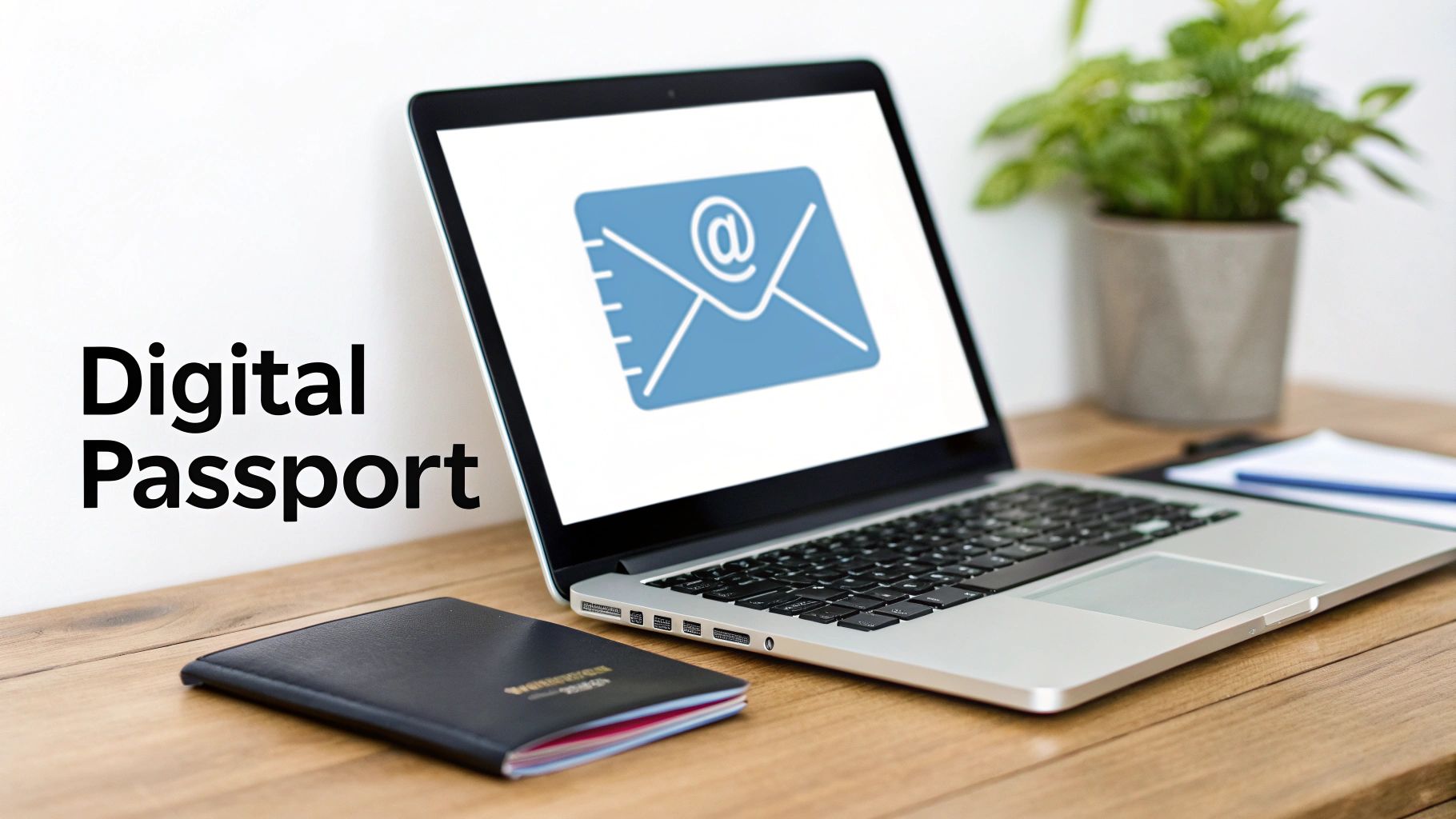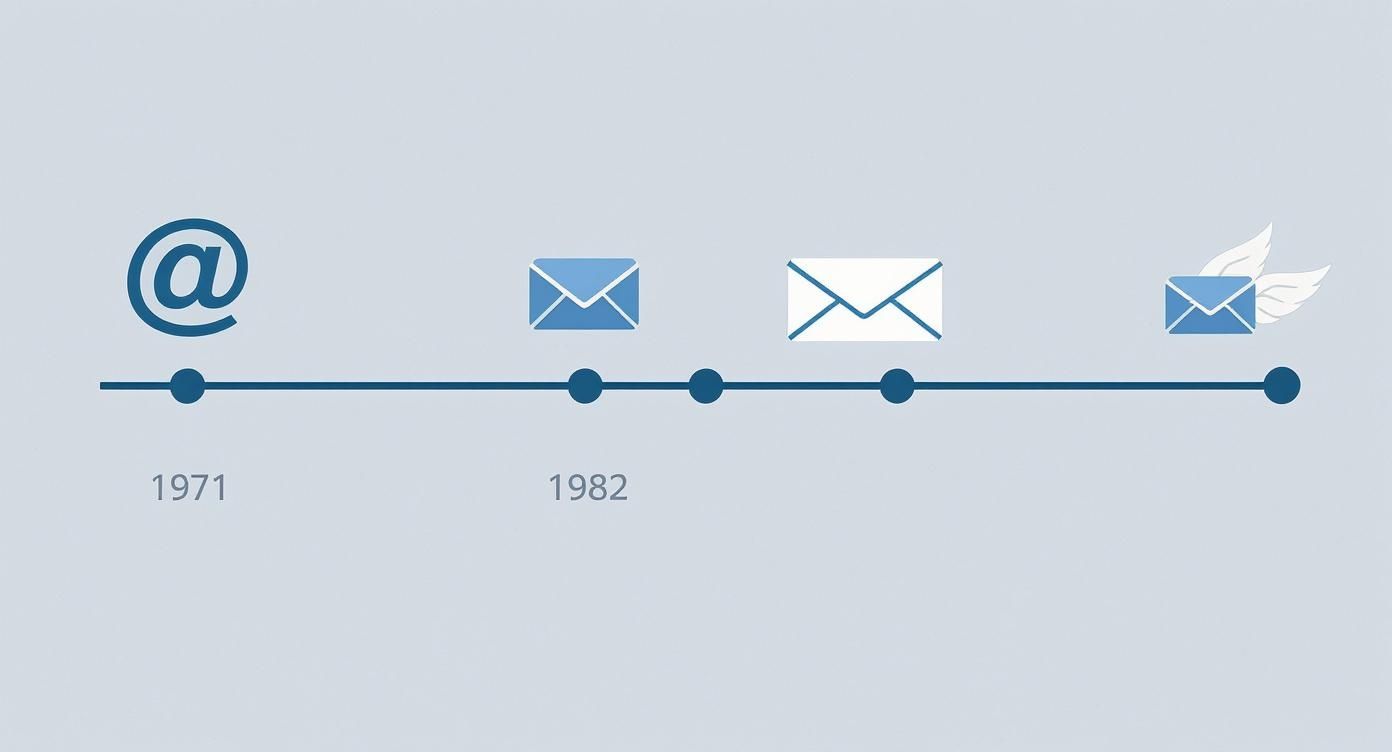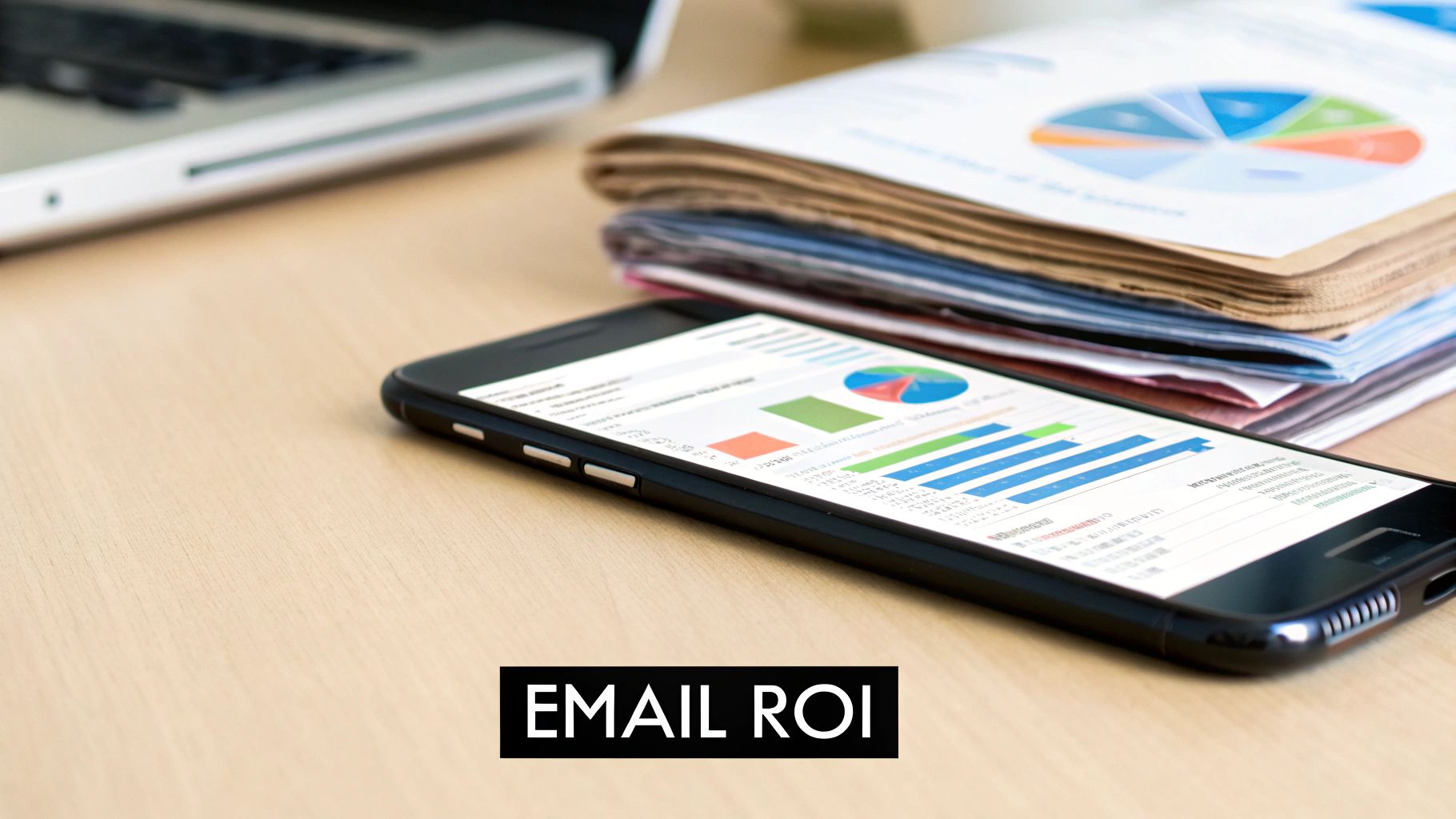With all the instant messaging apps and endless social media scrolls, you might wonder if email still matters. The answer is a resounding yes. Think of your email address not just as a mailbox, but as your digital passport. It’s the one key you need to unlock almost everything online, from your bank account to your favorite streaming service.
Email Is the Bedrock of Our Digital World
While flashy new platforms come and go, email is the quiet, dependable workhorse of the internet. Its real power lies in something increasingly rare online: ownership and control.
Your social media feed is governed by mysterious algorithms that decide who sees what. But your email list? That's an asset you own completely. It gives you a direct, unfiltered line to your audience, something no other platform can truly guarantee.
This direct connection is vital. For businesses, it's the engine that drives marketing, supports customers, and delivers official documents. For individuals, it's still the most respected and universally accepted way to handle important conversations.
The Four Pillars of Email's Importance
To really get a feel for its lasting power, let's break down its core strengths. Here’s a quick look at the fundamental reasons email remains a critical communication tool.
The Four Pillars of Email's Importance
| Pillar | What It Means for You | Key Application |
|---|---|---|
| Digital Identity | Your email is the key to your entire online presence. | Account creation, password resets, and security verification. |
| Direct Communication | It provides an unfiltered channel to your audience. | Marketing campaigns, client updates, and personal messages. |
| Professional Authority | A custom email domain adds credibility and trust. | Business proposals, official correspondence, and networking. |
| Permanent Record | Emails create a searchable, time-stamped archive. | Contracts, agreements, project management, and compliance. |
Of course, for email to be this effective, you have to make sure your messages actually land in the inbox. That's where practices like optimizing email deliverability become so important.
Ultimately, email's staying power comes from its open and universal design. Anyone can get an email address and talk to anyone else, no matter which provider they use—Gmail, Outlook, or a custom domain. No single company controls the whole system.
It's this reliable, decentralized structure that has allowed it to thrive for decades. If you're ready to build your own direct channel to your audience, our guide on how to create a mailing list is a great place to get started.
How Email Became Our Universal Communication Tool
To really get why email is still the king of digital communication, you have to look at where it came from. It wasn't born overnight. Instead, it grew over decades, built piece by piece to solve real-world problems and connect people in simpler, more direct ways.
Before the internet we know today, the earliest forms of email were basic text messaging systems used by academics and researchers on closed networks. It was a neat trick, but it was like having a phone that could only call other people in the same building. The first big leap forward came in 1971 with a simple, elegant solution: the "@" symbol.
That tiny symbol was a huge deal. It created a standard way to link a person's name to a specific computer or network, like user@host. Suddenly, you could send a message to a specific person at a specific digital location. This laid the foundation for the global addressing system we all use today.
Creating a Common Language for Mail
Even with a way to address messages, there was another problem. Early email systems were like isolated islands, each speaking its own language. A message sent from one network was just gibberish to another. The fix for this came in 1982 with the Simple Mail Transfer Protocol, or SMTP.
Think of SMTP as the universal rulebook for digital mail. It was like creating a global postal service standard that every mail carrier, no matter where they were, agreed to follow.
This standardization was the key that unlocked email’s potential. It guaranteed that a message sent from any system could be reliably delivered and read by any other system, anywhere in the world.
Without this common language, email would have stayed a patchwork of disconnected services. SMTP is what turned it into the unified, global network we depend on.
These milestones weren't just about clever code; they were about making communication accessible and reliable for everyone. Each step forward turned a niche tool for researchers into a global standard for billions. Email’s dominance today isn’t an accident—it’s the direct result of a long history of solving problems to connect us all.
The Unmatched Global Reach of Email
While new platforms pop up all the time, feeling fresh and exclusive, email’s real strength is its staggering scale. It's not just another way to talk to people; it's a global standard that cuts across borders, devices, and generations in a way nothing else can.
Think about it: a communication network that connects well over half the planet. That's email. It doesn’t force you to download the same app or join the same social circle as the person you're trying to reach. All you need is an internet connection, making it the most open and accessible digital communication system we've ever built.
This isn't some relic of the past, either. Email’s user base is still growing. For a business, that means direct access to a global audience. For you and me, it’s a reliable way to connect with anyone, anywhere.
A Network of Billions
The sheer number of people using email is mind-boggling, and it really gets to the heart of why email is so important to modern communication. It has a level of adoption that social media and messaging apps can only dream of.
As of 2025, there are an estimated 4.83 billion active email users across the globe. That's more than half the world's population and roughly 83% of all active internet users. Put another way, for every five people online, four are using email. And it's not slowing down—projections show that number swelling to 5.61 billion by 2030. You can discover more insights about these email usage statistics at cloudhq.net.
This infographic below shows some of the key historical moments, like the introduction of the "@" symbol and SMTP, that helped make this global takeover possible.
These early decisions created a universal standard that allowed email to grow from a niche tool for academics into the communication powerhouse we know today.
Why This Global Scale Matters
This incredible reach has real-world consequences for how we work and live. It's not just a big number; it’s what that number allows us to do.
- Universal Accessibility: Just about anyone with an internet connection can get an email address, usually for free. This makes it the most democratic form of digital communication out there.
- Platform Independence: Unlike closed systems like WhatsApp or Slack, email is decentralized. A Gmail user can talk to an Outlook user, who can talk to someone on a private company server, all without a hitch.
This decentralized nature is email's superpower. No single corporation owns it, meaning it can't be shut down or changed on a whim by one company's business plan. It’s a truly open standard for the world.
This independence, combined with its massive user base, is exactly why email continues to be the backbone of our digital lives. It’s the default for everything from official business letters and job applications to bank alerts and managing our online accounts. Its global scale pretty much guarantees it will remain a cornerstone of communication for a long, long time.
Email Is the Engine of Modern Business
In the professional world, email is far more than just another way to talk. It's the central nervous system of modern business. While Slack and Teams are great for quick, informal pings, email remains the official, documented backbone for almost every critical operation.
Think of it as the digital version of a formal business letter, a filing cabinet, and a project manager all rolled into one. It’s the arena where deals are hammered out, contracts are finalized, and major company announcements are shared. This formal capacity is a key reason why email is so important to modern communication in any corporate setting.
The Power of a Permanent Record
Unlike a chat message that can vanish into the digital ether, every email creates a permanent, time-stamped record. This isn't just a handy feature; it's a cornerstone of professional accountability and risk management.
Imagine trying to manage a complex supply chain. Every purchase order, shipping confirmation, and quality check sent via email becomes part of a searchable, verifiable trail. If a dispute pops up months down the line, that email archive is the undisputed source of truth, protecting everyone involved.
This ability to create a clear, chronological history of communication is invaluable. It provides the evidence needed for legal compliance, internal audits, and resolving misunderstandings, ensuring that decisions and agreements are always documented.
This digital paper trail is crucial for everything from tracking a project’s progress to confirming a client’s approval. It cuts through ambiguity and establishes a clear line of responsibility that informal chat platforms just can't match.
Driving Productivity and Collaboration
Email is also the workhorse that keeps daily productivity and team coordination on track. It enables smooth workflows by letting team members assign tasks, share important files, and track progress without needing to be online at the same time.
Its deep integration with calendars, project management tools, and CRM systems makes it the command center for organizing the workday. This is why professionals are so tethered to their inboxes. In fact, 88% of business users check their email multiple times a day, with many checking it more than 20 times daily, according to research from Optinmonster.
This constant connection underscores just how essential email is for keeping business moving.
- Formal Documentation: Email is the go-to for sending legally binding documents, official proposals, and HR notices.
- Client Relationship Management: It offers a professional and documented channel for building client relationships, from the first hello to ongoing support. Check out our guide on using email marketing and lead generation to see how this works in practice.
- Asynchronous Collaboration: Teams spread across different time zones can work together seamlessly, sharing updates and feedback without needing to schedule a live meeting.
The Hub of Professional Identity
Finally, a professional email address—like [email protected]—is a cornerstone of your business identity. It signals credibility and legitimacy in a way a generic email or a social media handle simply can't.
When you send a message from a custom domain, you’re not just sending an email; you're representing your brand and reinforcing its professionalism with every interaction. It's a small detail that builds trust with clients, partners, and prospects from the very first touchpoint.
Why Email Delivers Unbeatable Marketing ROI
Think about all the marketing channels out there. Social media algorithms are constantly changing, and what worked yesterday might not work tomorrow. It feels like you’re renting space on someone else's property—the rules can change overnight, and your access to your audience can disappear.
Email is different. Building an email list isn't just another marketing tactic; it's about creating a tangible asset for your business. You own this list. It's a direct, reliable line to your customers that no algorithm can take away. That's why it remains a cornerstone for any brand serious about long-term growth.
This direct channel also fosters a much deeper connection. A social media post is a public broadcast, but an email lands in a private, personal space. It’s a one-on-one conversation, giving you a chance to build real rapport in a way a noisy, crowded feed just can't.
The Power of Permission and Personalization
The real strength of email marketing comes from a simple concept: permission. Every single person on your list has opted in. They’ve raised their hand and said, "Yes, I want to hear from you." This makes them a warm audience right from the start.
This foundation of consent is where the magic happens, opening the door to strategies that drive incredible results.
- Deep Personalization: You can tailor messages based on what someone has bought, browsed, or where they live. This makes your communication feel genuinely helpful, not just another sales pitch.
- Audience Segmentation: Imagine an online store sending a discount on running shoes only to people who have bought athletic gear before. By grouping subscribers, you can send laser-focused campaigns that resonate and convert.
This kind of targeted communication just isn’t feasible on most other platforms. The financial results speak for themselves. With billions of emails zipping across the internet daily, businesses see an average ROI of $36 for every $1 spent. And it's what customers want—around 60% of consumers say they prefer brands to contact them through email. You can dive into the full research about these email marketing statistics on EmailToolTester.
Owning your audience through email is the difference between building your business on solid ground versus shifting sand. It provides stability, predictability, and a direct path to nurturing customer relationships that last.
Ultimately, great email marketing isn't just about blasting out promotions. It’s about building a loyal community around your brand. When you consistently deliver value straight to someone's inbox, you create trust, loyalty, and customers who keep coming back. Curious about what it takes to get started? You can learn more about email marketing costs in our detailed guide.
The Evolving Future of Email Communication
Despite what you might hear about new apps taking over, email isn’t going anywhere. In fact, it’s getting a serious upgrade. The inbox of tomorrow is being built today with smart, interactive, and rock-solid security features that keep it at the very heart of how we communicate.
The biggest driver of this change? Artificial Intelligence. AI assistants are already becoming a standard feature, doing the heavy lifting by sorting messages, flagging what's important, and even suggesting replies. This turns a chaotic inbox into a streamlined command center, saving you time and keeping you focused.
This evolution is a perfect example of why email is so important to modern communication—it’s moved way beyond just sending and receiving text.
Making the Inbox Interactive
One of the most exciting shifts is the move toward interactive email. Instead of being a static message that sends you somewhere else, the email is the destination. You can now take action right from your inbox.
Email is transforming from a simple messaging tool into a central hub for managing digital activities. It’s not just surviving; it's innovating.
Imagine being able to:
- RSVP to an event with a single click inside the message.
- Fill out a quick survey without ever leaving your inbox.
- Scroll through a product gallery and add an item to your cart on the spot.
This evolution turns the inbox from a passive place for reading into a dynamic space for getting things done.
A Future Built on Security
As our inboxes become more powerful, the security protecting them is getting smarter, too. With more of our lives running through email, the need for better protection has never been higher.
Advanced encryption and sophisticated phishing detection are constantly improving, creating a stronger defense against new and emerging threats. These changes make it clear that email isn't just sticking around—it's evolving into an even more intelligent and essential tool for the future.
A Few Common Questions About Email
Email has been around for decades, but new tools and challenges mean we're always re-evaluating its place in our lives. Let's dig into a few questions that pop up all the time.
Hasn't Email Been Replaced by Slack or Teams?
That's a common misconception. While platforms like Slack and Microsoft Teams are brilliant for quick, internal team chatter, they haven't replaced email—they just handle a different type of conversation.
Think of it this way: Slack is the office hallway, perfect for rapid-fire questions and project updates. Email, on the other hand, is the official boardroom. It’s the universal standard for communicating with anyone outside your organization, from clients to partners.
Plus, email provides a permanent, searchable record. When you need to send a contract, a formal proposal, or any critical document, email is still the go-to for creating an official paper trail.
What's the Secret to Beating Email Overload?
Feeling buried under a mountain of messages is something we can all relate to. The key isn't to just work harder, but to manage your inbox smarter.
Start with some simple but powerful habits: use filters to automatically sort incoming mail, be ruthless about unsubscribing from newsletters you never open, and—this is a big one—schedule specific times to check your inbox instead of letting every notification derail your focus.
Try adopting a "one-touch" rule: whenever you open an email, deal with it immediately. Reply, archive, delete, or delegate it right then and there. This single habit stops messages from festering in your inbox and turning into a source of stress.
Is Email Actually Secure Anymore?
It's a valid concern, but email security has come a long way. Today’s top providers have built in some serious defenses, like end-to-end encryption, multi-factor authentication (MFA), and incredibly sophisticated systems for sniffing out phishing attempts.
No communication method is 100% foolproof, of course. But for the vast majority of day-to-day business, email is a perfectly secure channel. If you're handling extremely sensitive information, it's wise to look into dedicated encrypted email services.
Ultimately, your own digital habits are your best defense. Using strong, unique passwords and being skeptical of suspicious links will always be your strongest line of protection.
Ready to build a powerful online presence that drives results? At Sugar Pixels, we specialize in creating stunning websites and strategic digital marketing campaigns that convert. Start building your brand with us today!



